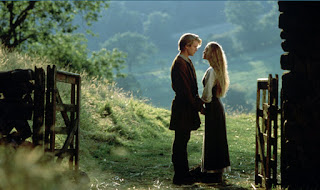As You Wish: What The Princess Bride Taught Me About Love

Marriage
"Mawwiage is what bwings us togevah today."
Throughout the Bible, the relationship between a husband and wife is often used as a symbol - or "type" - of God's relationship with His people, and Christ's relationship with His Church. (Engraved on the inside of my wedding ring is the abbreviation "EPH 5:25," to remind me of the Bible verse from Paul's letter to the Ephesians: "Husbands, love your wives, as Christ loved the church and gave himself up for her.") Ever since reading Christopher West's book Fill These Hearts (more on that in the Catholic Pick below), I've often viewed love stories in pop culture through this lens. The Princess Bride is no exception.
I'm not saying the filmmakers had the intention of teaching us about our relationship with God. But creation tends to point back to the Creator. Since God created us male and female, the relationships between men and women will reveal truths about God. So it's no surprise that a writer who wants to tell a love story will include aspects that can be applied to Christ and the Church, whether or not he or she intends to do so. Ultimately, the writer's intent is inconsequential. The work (the movie, book, play, etc.) stands on its own.
If I'm applying this parallel to The Princess Bride, then Westley would represent Jesus, and Buttercup would represent the Church - or more specifically, the individual viewer. It's funny: when I first started writing this blog post, I expected the parallel to be a bit of a stretch. But then it occurred to me for the first time that Westley suffered and died for Buttercup, and even rose from the dead. Sound familiar?
Fidelity
"My Westley will always come for me."
A common theme in The Princess Bride is that Westley always comes for Buttercup, no matter what. Whether she is forcibly betrothed to Prince Humperdinck, captured by the perpetually incredulous Vizzini ("Inconceivable!"), ignited by flame spurts, swallowed by lightning sand, or attacked by R.O.U.S.'s, Westley always saves her. Like Westley, there is nothing that can stop God from loving us. There is no sin that He cannot forgive (provided, of course, that we ask His forgiveness).
Doubt
"He didn't come."
It's interesting that after everything Westley had done so far, Buttercup still doubts him after her "wedding" to Humperdinck is hastily concluded. She even heard what she assumed to be Westley breaching the castle defenses earlier in the ceremony. But Humperdinck's insistence that he had killed Westley, coupled with the abrupt ending of the wedding rite, seems to plant doubt in her. Not only does she doubt, she despairs, and comes perilously close to taking her own life. Too the viewer, this may seem the epitome of foolishness. But then, the viewer knows that Westley is alive and in the process of rescuing Buttercup. In our own lives, it's easy to see all the positive ways God has intervened - and all the blessings he's showered upon us - when things are going well. But in the midst of tragedy, those blessings are not always as apparent. It might even feel like God has abandoned us completely. The lesson we can take from The Princess Bride is that there is always a reason for hope.
Since it is a fairy tale, this manifestation of this reason for hope is rather simplistic in The Princess Bride: Westley is physically in the room. In times of despair, our reasons for trusting in God are rarely so obvious. But I will dive deeper into the virtue of hope in a future blog post. Stay tuned!
Catholic Pick: Fill These Hearts
I am a participant in the Amazon Services LLC Associates Program, an affiliate advertising program designed to provide a means for sites to earn advertising fees by advertising and linking to Amazon.com. This means my reviews, GCD Picks, and some other posts include links to Amazon in case you want to buy the product after reading my review. If you do make a purchase via my affiliate link, I'll get a few cents.
I first discovered Christopher West through his book The Good News About Sex & Marriage, which explained the Catholic teaching on sexuality and marriage (aptly named, right?), and unpacked Pope St. John Paul II's "theology of the body." My wife and I both read that book when we were engaged, and it blew us away. Not that any of the teachings themselves were shocking, but the way West (and John Paul II before him) explained and presented them was revolutionary. So much so that we have since bought copies of the book for engaged friends. You can find that book here.
After we were married, we heard about a new book by Christopher west called Fill These Hearts. The main idea behind this book is that our sexual desires and all of our physical, earthly desires - while they can be a source of temptation - are actually a gift from God. By pursuing these desires according to God's design, we realize that God is the only one who can ultimately fulfill our desires. Our earthly hunger points us toward a heavenly banquet.
But don't take my word for it; my brief explanation doesn't do the book justice. Christopher West lays it all out for you. As I stated in the main post, this book changed the way I look at many aspects of life. You can find it on Amazon here.
Conclusion
Thanks for reading! If you like my blog, and you'd like to receive emails each time I upload a new post, you can enter your email address below. Or, you can "Like" or "Follow" GCD's Facebook page here. Find me on Twitter here. Am I way off base comparing Westley and Buttercup to Christ and the Church? What are some other examples of movies with religious themes, intentional or unintentional? If you want to express an opinion, ask a question, or give feedback about this post or others, feel free to leave a comment below, or email me at geekycatholicdad@gmail.com.
If you would like to send a few pennies my way (which I use to pay for hosting the site), you can use my Amazon links to purchase any of the items I have recommended, or anything at all from Amazon. Alternatively, you can click the Amazon link here, and then proceed with your Amazon shopping.



Comments
Post a Comment